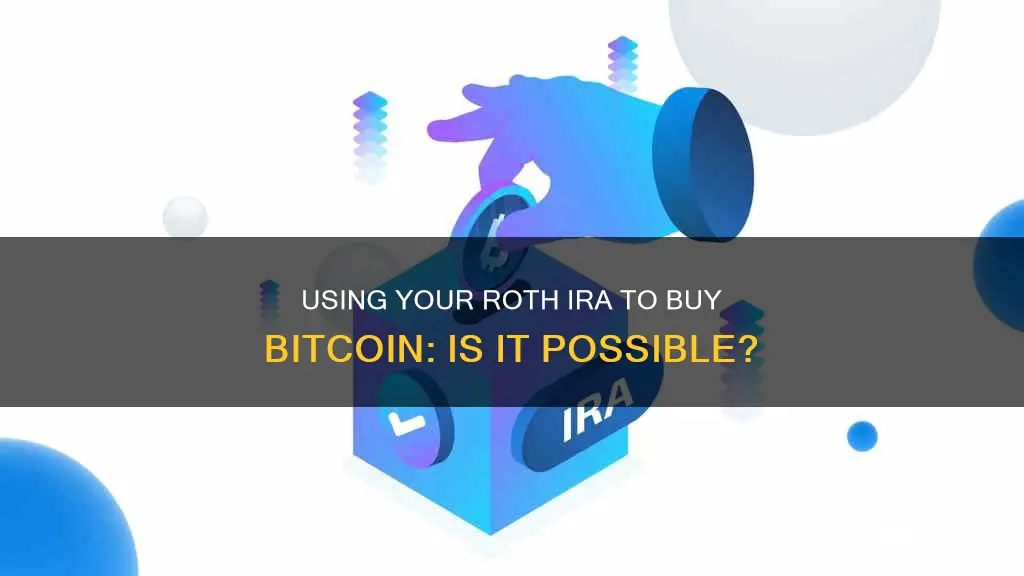
Investing in Bitcoin for retirement is an attractive prospect for many cryptocurrency enthusiasts. However, there are several factors to consider when it comes to buying Bitcoin with your Roth IRA investment account. Firstly, according to Internal Revenue Service (IRS) rules, you cannot directly contribute cryptocurrency to your Roth IRA. This has led to the emergence of Bitcoin IRAs, which are retirement accounts specifically designed for investing in cryptocurrencies. While holding crypto in a Roth IRA has tax benefits, it's important to note that only a few Roth IRA providers allow this, and there may be additional fees and risks involved.
| Characteristics | Values |
|---|---|
| Type of Account | Self-directed IRA |
| Cryptocurrencies | Bitcoin, Ethereum, Litecoin, Bitcoin Cash |
| Tax Advantages | No immediate tax deduction, tax-free withdrawals in retirement |
| Conditions for Tax-Free Treatment | Roth IRA must be open for at least five years, account holder must be at least 59 1/2 years old when making the withdrawal |
| Investment Options | Crypto-related investment products, including coin trusts, futures, and stocks with crypto exposure |
| Transaction Fees | 1-2% on each transaction |
| Custodians | Bitcoin IRA, Bit IRA, iTrustCapital |
| Secure Storage Solutions | Cold storage, multi-signature wallet |
What You'll Learn
- A Bitcoin IRA is a type of self-directed IRA that holds cryptocurrency
- You can't contribute crypto directly to a Roth IRA, but you can add it by purchasing
- Crypto IRAs have high fees and extreme volatility, making them a poor choice for retirement investment
- Crypto IRAs can be a good way to diversify your portfolio
- You can buy crypto with a Roth IRA by establishing an IRA with a company that allows it, transferring funds, and then buying crypto

A Bitcoin IRA is a type of self-directed IRA that holds cryptocurrency
A Bitcoin IRA is a self-directed Individual Retirement Account (IRA) that allows investors to hold Bitcoin and other cryptocurrencies in their retirement portfolio. These accounts are only available through specialised custodians who are equipped to manage the storage and security of digital assets.
Bitcoin IRAs offer several benefits, including the potential for tax-free growth and withdrawals in retirement, as well as diversification of investment portfolios. The main advantage of a Bitcoin IRA is that, while contributions are made with after-tax dollars with no immediate tax deduction, qualified withdrawals in retirement are typically tax-free. Additionally, cryptocurrencies are considered low-correlation assets, so investing in Bitcoin can protect your portfolio if other asset classes fall in price.
However, it is important to note that fees for crypto IRAs are typically much higher than for traditional IRAs, and the extreme volatility of cryptocurrencies makes them a poor choice for a retirement investment for those investors approaching retirement who cannot wait out a downturn.
The Ultimate Guide: Investing in Bitcoin
You may want to see also

You can't contribute crypto directly to a Roth IRA, but you can add it by purchasing
While you can't contribute crypto directly to a Roth IRA, it is possible to add it to your account by purchasing. This is because, since 2014, the Internal Revenue Service (IRS) has considered Bitcoin and other cryptocurrencies in retirement accounts as property. Therefore, you can add crypto to your IRA via purchase, even though you can't contribute it directly.
However, finding a provider that allows you to do this may be difficult. Traditional providers of IRAs rarely permit the addition of crypto to a Roth IRA. As a result, "Bitcoin IRAs" have emerged as a workaround. These are retirement accounts specifically designed to enable investment in cryptocurrencies.
To purchase crypto for your Roth IRA, you will first need to find an IRA company that allows you to buy cryptocurrency with the funds in your account. Ensure that the company is regulated and licensed. You will then need to fund your crypto-compatible retirement account by sending contributions to that account, transferring funds from an existing account, or rolling over your current account into a crypto-compatible one. Once your account is funded, you can begin purchasing crypto.
It is important to note that fees for crypto IRAs are typically much higher than for traditional IRAs, and there are additional risks associated with investing in cryptocurrency.
UK Guide: Investing Money in Bitcoin
You may want to see also

Crypto IRAs have high fees and extreme volatility, making them a poor choice for retirement investment
While Crypto IRAs can be a good way to save on taxes and diversify your retirement portfolio, they are not without their drawbacks. Here are some reasons why Crypto IRAs may not be the best choice for retirement investment:
High Fees
One of the main drawbacks of Crypto IRAs is the high fees associated with them. These fees can include initial setup fees, annual maintenance fees, custody fees, trading fees, and more. For example, setting up a $50,000 self-directed IRA for trading can cost up to $6,000 in charges, depending on the provider. These fees can significantly eat into any potential gains and may even negate the tax advantages offered by IRAs.
Extreme Volatility
Another major concern with Crypto IRAs is the extreme volatility of the cryptocurrency market. Cryptocurrencies like Bitcoin have experienced significant price fluctuations, making them a risky investment for retirement. For individuals approaching retirement who may not have the time to ride out a downturn, this volatility can be especially detrimental.
Difficulty in Finding a Custodian
As per IRS rules, you cannot contribute cryptocurrency directly into a Roth IRA. To include crypto in your IRA, you need to find a custodian who is willing to accept cryptocurrency, which can be challenging. While self-directed IRAs (SDIRAs) allow alternative assets like cryptocurrencies, the number of providers offering this service is limited.
Regulatory Uncertainty
The regulatory landscape for cryptocurrencies is still evolving, and it is unclear how this will impact Crypto IRAs in the future. The IRS does not recognize a distinct IRA for cryptocurrencies, and there is no specific mention of cryptocurrency in the tax code for Roth IRAs. This lack of clarity could lead to potential issues down the line.
Security Concerns
Given the nature of cryptocurrencies, security is a significant concern for Crypto IRAs. As digital assets, cryptocurrencies are vulnerable to hacking and theft, and there is a risk of losing your entire investment if proper security measures are not in place.
In conclusion, while Crypto IRAs can offer tax advantages and portfolio diversification, they also come with high fees, extreme volatility, regulatory uncertainty, and security concerns. Therefore, individuals considering Crypto IRAs for retirement investment should carefully weigh the pros and cons before making a decision.
The Ultimate Guide to Solo Bitcoin Investing
You may want to see also

Crypto IRAs can be a good way to diversify your portfolio
Tax Benefits
IRAs, or Individual Retirement Accounts, are a great way to provide future financial security. Crypto IRAs, also known as Bitcoin IRAs, are a unique investment vehicle that allows individuals to hold Bitcoin and other cryptocurrencies within their IRA. One of the main benefits of Crypto IRAs is that they offer substantial tax advantages that many other types of investment accounts don't have. With a Roth IRA, contributions are made with after-tax dollars, meaning you don't get an immediate tax deduction. However, the main advantage of a Roth IRA is that qualified withdrawals in retirement are tax-free.
Diversification
Another benefit of Crypto IRAs is that they can help diversify your retirement portfolio. Cryptocurrencies are considered low-correlation assets, which means that investing in them can protect your portfolio if other asset classes fall in price. Additionally, by including cryptocurrencies in your IRA, you can take advantage of their potential exponential growth while enjoying the tax benefits of the account type you choose.
24/7 Trading
Crypto IRAs also offer the advantage of 24/7 trading. This allows individuals to buy, sell, or swap cryptocurrencies at any time, providing more flexibility and control over their investments.
Long-Term Wealth Accumulation
Crypto IRAs can also be a valuable tool for long-term wealth accumulation. The potential for tax-free growth and tax-free withdrawals in retirement makes them an attractive option for those looking to build their wealth over time.
However, it's important to note that investing in cryptocurrencies carries risks, including price volatility and the potential for loss. Additionally, the fees associated with Crypto IRAs may be higher than those for traditional IRAs, and it may be difficult to find a provider that allows you to hold cryptocurrencies in your IRA. Therefore, it's essential to carefully consider your investment objectives and conduct thorough research before making any decisions.
Why You Don't Need Bitcoin to Invest in Ripple
You may want to see also

You can buy crypto with a Roth IRA by establishing an IRA with a company that allows it, transferring funds, and then buying crypto
Yes, you can buy crypto with a Roth IRA. Here is a step-by-step guide on how to do it:
Step 1: Establish a Roth IRA with a company that allows crypto purchases
Firstly, you need to open a Roth IRA with a company that allows you to buy cryptocurrency with their accounts. It is important to check that they are licensed and regulated. The company should be a bank, trust company, or credit union, or a broker-dealer specifically approved by the IRS. Be cautious of third-party administrators who use someone else's trust license to offer IRAs.
Step 2: Transfer funds into the Roth IRA
Next, you will need to fund your crypto-compatible Roth IRA. You can do this by contributing new funds, transferring funds from an existing IRA or 401(k), or rolling over an employer-sponsored plan into a Rollover IRA. Remember that there are annual limits on how much you can contribute to a Roth IRA, which are $7,000 for 2024, or $8,000 if you are aged 50 or older.
Step 3: Buy crypto with the Roth IRA
Once your Roth IRA is funded, you can start buying crypto with the funds. You cannot transfer any existing crypto you own into the Roth IRA – it must be purchased with the funds in the account.
Other considerations
While it is possible to buy crypto with a Roth IRA, there are some important things to keep in mind. The IRS does not allow you to place property, including securities or bonds, in retirement accounts. However, because they consider cryptocurrencies to be property, you can buy crypto with funds from your Roth IRA and hold it there.
Additionally, it can be challenging to find a company that lets you use the funds from your Roth IRA for crypto purchases. You will likely need to look for a company that allows you to include crypto in a self-directed IRA, which gives you more control over what is in your account.
It is also important to be aware of the risks involved in investing in cryptocurrency. Crypto is a very volatile asset, and its price can fluctuate by hundreds of dollars a day. There are also regulatory, insurance, and fraud risks associated with crypto investments.
Finally, remember to consult the fee structure of the IRA company and be aware of any trading or annual account fees that may apply.
Bitcoin's Early Days: Turning $1 into Millions
You may want to see also
Frequently asked questions
Yes, you can buy Bitcoin with a self-directed, crypto-compatible Roth IRA. However, you generally won't be able to buy them with a regular Roth IRA.
First, you need to establish a Roth IRA with a company that allows you to buy crypto with their accounts. Then, you need to transfer, roll over, or contribute to the IRA. Finally, you can use the funds in the IRA to buy crypto.
Buying Bitcoin with a Roth IRA offers tax advantages, diversification, and the potential for high returns.
Buying Bitcoin with a Roth IRA introduces substantial risk to your retirement portfolio due to the volatility of cryptocurrencies. There are also additional fees associated with crypto IRAs, such as set-up fees, transaction fees, and annual account management fees.







